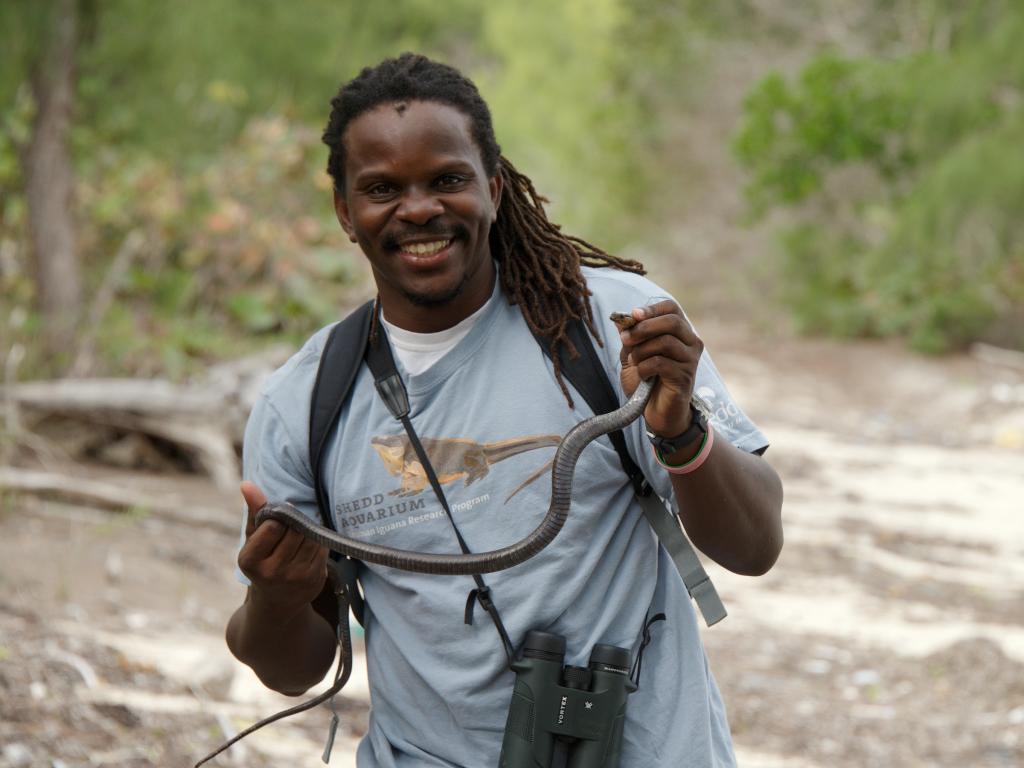caribbean
Making a big difference with small islands
If you were stranded on an island, what three things would you want to find in your pockets? In the Caribbean, you might want a nice pair of binoculars. The historical isolation of these islands—most of which were never connected to other land—has allowed thousands of species to evolve into a rich diversity of forms, such as solenodons (venomous mammals), rainbow-colored amazon parrots, and giant frogs. Collectively, these islands contain more than 11,000 plant species and more than 1,300 vertebrate animals, and are part of the Caribbean Biodiversity Hotspot.
And don’t forget the water! The Caribbean Sea boasts 10,000 square kilometers of reefs, 22,000 kilometers of mangroves, and 33,000 square kilometers of seagrass beds. It also harbors a rich community of wildlife, including 3,000 species of lobsters, crabs and molluscs, and at least 1,300 fish. The mangroves alone lock away even greater amounts of carbon dioxide by area than their terrestrial forest counterparts, making them critically important in addressing the climate crisis.
Unfortunately, the Caribbean is also facing the highest extinction rates in modern history. Introduced species such as rats, goats, mongooses, dogs and cats have been wreaking havoc on the native terrestrial wildlife since Christopher Columbus first arrived. Since then, the Caribbean Islands have seen 10% of the world’s bird extinctions, 38% of mammal extinctions, and over 65% of reptile extinctions. More than two-thirds of these extinctions are the result of invasive species feeding on native wildlife.
The Caribbean Islands are also very vulnerable to climate change, with small islands in danger of disappearing as the result of sea level rise and hurricanes becoming more frequent and powerful. The tourism industry—while crucial to small island economies and dependent on a healthy natural environment—is also continually degrading coastal forests and offshore islands.
More than 1,200 Caribbean species are currently listed as globally threatened with extinction, including 49% of reptiles, 75% of amphibians, and nearly 100% of the surviving native land mammal species. Thousands more remain to be assessed. Yet the Caribbean receives far less international attention and support than other parts of the tropics. Enter Re:wild.
The Re:wild Solution
Re:wild works with our main partner on the ground—Fauna & Flora International—as well as local organizations and communities across the Caribbean toward a shared vision of “more resilient Caribbean ecosystems, restored and managed by a network of local organizations.” Together we aim to achieve this by restoring island ecosystems and reversing the decline of at least 50 globally threatened species. We will do this by:
Restoring severely degraded habitats by removing harmful invasive species and replanting trees
Recovering and reintroducing some of the rarest animals and plants on the planet
Establishing new protected areas, including through land purchases, and supporting successful management
Training and mentoring national guardians and volunteers to monitor and manage biodiversity
Developing educational programs, including field trips, to foster lasting appreciation of wildlife and wild places
Enabling local communities to enjoy and prosper from natural resources without destroying them
Combating illegal wildlife trade, including an upsurge in poaching of reptiles for the international pet trade
Re:wild and our partners aim to boost the natural resilience of functioning ecosystems to the adverse impacts of climate change, while simultaneously reducing the vulnerability of local communities to destruction. In fact, studies have found significantly less flood damage to homes and infrastructure in areas with intact coral reefs, mangroves, seagrass meadows and coastal wetlands than in areas where such natural ecosystems were destroyed or degraded.
We are helping implement tailored projects in Anguilla, Antigua and Barbuda, The Bahamas, Cuba, Jamaica, Haiti, Saint Lucia, St. Vincent & the Grenadines, and Trinidad and Tobago. From dramatically rewilding Redonda Island to establishing the first-ever private nature reserve in Haiti, to replanting mangrove forests in The Bahamas, Re:wild is committed to helping our partners tackle the onslaught of challenges facing the Caribbean’s unique and important wildlife.
Top photo: St. Lucia in the Caribbean. (Robin Moore, Re:wild)

